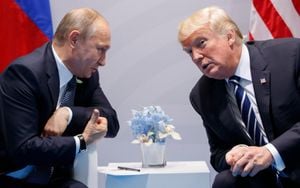The United Kingdom has sparked significant concern after announcing plans to deploy troops to Ukraine, with Russian authorities reacting with vehement opposition. Kremlin spokesperson Dmitri Peskov labeled the potential move as unacceptable, stating during a press briefing, "This becomes completely different from the point of view of our security." The UK’s proposal is part of discussions for establishing peacekeeping forces amid the complex circumstances surrounding the conflict between Ukraine and Russia.
UK Prime Minister Keir Starmer expressed his readiness to contribute troops as part of a broader strategy to bolster security guarantees should any peace agreement between Ukraine and Russia materialize. Starmer stated, "We are ready and willing" to send these forces, emphasizing the need for international support as the region faces prolonged instability.
The suggestion includes deploying nearly 30,000 European military personnel to Ukraine, contingent on U.S. support. The plan indicated diplomatic engagements with the current U.S. administration, as previous remarks suggested exclusive negotiations were taking place between Washington and Moscow, potentially sidelining European influence. This development aligns with concerns noted by the Kremlin, as Peskov stressed, "We are alarmed; we are talking about possible military contingents from NATO countries being sent to Ukraine. This poses serious risks to our sovereignty.”
Historically, NATO's eastward expansion has been met with skepticism from Russian officials, insisting on the reinstatement of safety protocols surrounding military presence along its borders. Russian Foreign Minister Sergey Lavrov has also reiterated this sentiment, claiming, "We will see this as a direct threat to Russia's sovereignty, regardless of any flags under which troops might operate."
Tensions have escalated as European leaders discuss military deployments and nurtured sentiments depict varying national responses. While some nations express willingness, like France, which may contribute around 10,000 troops, others remain ambivalent or opposed. Nations such as Sweden and the Netherlands are considering options but have yet to finalize decisions, whereas Germany, Poland, and Spain have claimed they would not support troop deployments for now, stressing the necessity for strong Ukrainian forces without external intervention.
President Volodymyr Zelensky of Ukraine has taken the opportunity to propose a different militaristic approach to safeguarding Ukraine, detailing plans to establish "European Armed Forces" capable of responding to pressures from Russia through armed commitment rather than permanent foreign troops. Underscoring self-sufficiency, Zelensky highlighted, "We do not necessarily require foreign troops. Our focus should be on advanced defense systems and air protection for Ukraine, ensuring independence and sustainability."
The proposed future military force primarily aims to secure airspace and maritime trade routes, integral for Ukraine’s economy, particularly for grain exports—crucial during these challenging times when military aggression threatens daily operations.
Nevertheless, the overarching question remains: will European nations effectively rally around this initiative, or will the experience of years of relative stability leave them unprepared for decisive military action? A sense of urgency burgeons as time elapses without clear substantiation. Political leaders across Europe, recognizing the unsteady balance of power, are urged to strengthen their positions vis-a-vis Russian militarization.
Uncertain of its immediate execution, the conversation surrounding this deployment reflects Europe’s broader defense challenges and reveals weak undercurrents within joint military exercises held throughout the continent aimed mainly at preparatory measures. Only recently, political signals have indicated readiness to abandon previously held positions; debates are rising among political leaders to reformulate defense strategies.
The thorough assessment of these movements becomes particularly pressing amid the current backdrop of military readiness, where analysts express the following sentiment—Europe cannot continue to function under the guise of peace as Russia bolsters its artillery and habitually factors international tensions. If NATO allies are skeptical about the UK’s plan, it could stifle their position during future negotiations, prompting potential hesitance to adequately support peacekeeping risks.
Regardless of the outcome, it is clear the geopolitical dynamics surrounding UK troop formations have become interlocked with the larger strategic fabric threading through Europe. The potential mobilization highlights the shifting nature of allegiances and the need for decisive action as the war takes its toll on the region. While the concept of European troop support moves toward discussions, practical implementations necessitate consensus and collective commitment among nations, underscoring the immediate demand for unity.
Consequently, this continuing backdrop challenges not only military protocols but re-evaluates defense manufacturing capabilities across Europe—a reality denoted by the shrinking capacities previously evoked under environments of peace. The response to the previous decades of disengagement juxtaposes the urgent reality of warfare influencing daily governance and diplomatic relations moving forward. Therefore, as talks gain momentum, paving the way for any potential agreements, Europe’s capacity to propel its defense presence remains up for scrutiny amid heightened tensions on the continent.



